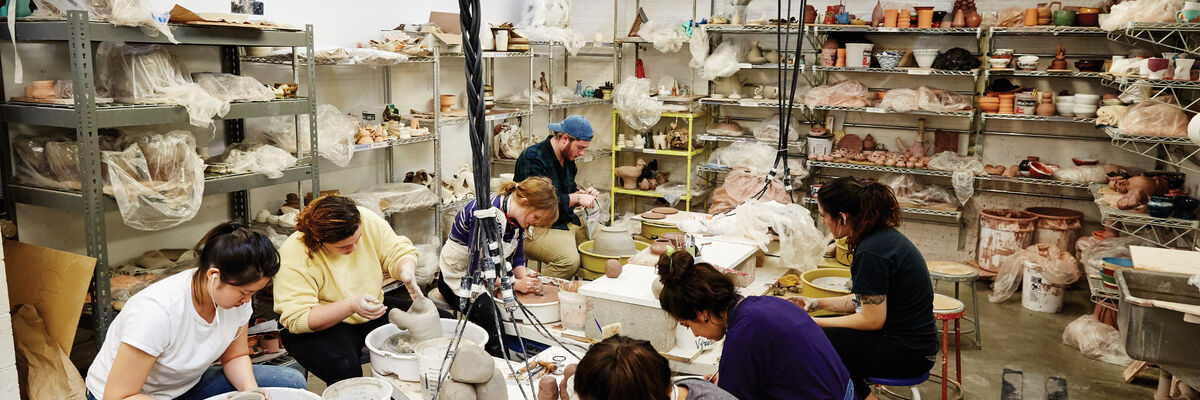
Go-Go Gadget Community
by Anjulie Rao (MA 2014)
Walking into MB Labs, a large live-work space located in Chicago's West Loop, is like walking into the digs of Inspector Gadget. Curiosities abound: giant spider-like programmable drawing machines, a robot drum set, flat screen monitors, deconstructed electronics, hardware, machining tools, and a cheeky housecat named Echo who lounges among the computers.
A dynamic collaboration between SAIC alumni Josh Billions (BFA 2012), David Hull (MFA 2012), and Harvey Moon (BFA 2012)—along with Massachusetts Institute of Technology alum Bill Fineup—MB Labs has been making a splash on the national tech scene since 2012. As a small business, the group focuses on producing intelligently designed commercial products. However, they never neglect their creative impulses as artists and designers—participating in and winning this year's Red Bull Creation Challenge in Brooklyn, New York. And, through all of their playful, innovative work as artists and entrepreneurs, they are bringing together Chicago's most diverse community of professional and amateur makers and hackers.
Moon and Billions met during their time at SAIC in the Art and Technology Studies department. "We immediately hit it off—we started living and making projects together," says Moon. Each brings a unique skillset: Moon is a new media artist focusing on kinetics and robots. Billions considers himself a "serial entrepreneur." Hull, an experienced industrial designer and current Designed Objects instructor at SAIC, joined the group later: "It was a Red Bull project that brought [Hull] into the mix," Moon continues.
Each year, Red Bull challenges designers from all over the country to compete in the Red Bull Creation Challenge, in which groups of varying sizes have 72 sleepless hours to live-build a device of their own design based on materials provided by Red Bull. This year, MB Labs created Autoloop, a drum machine that lets users control a drum set via sensors that determine rhythm depending on where objects are placed on a separate device. The group won the grand prize of $10,000.
"Red Bull gave us an opportunity to do what we love doing in art and technology. It's our opportunity to be free of functional constraints—what happens when you just get to play," says Hull. This is in contrast with their more functional object creations such as Scout Alarm, a sleek, modern home security system that uses Ethernet, a cellular modem, and the user's mobile device to notify users of potential break-ins. For this project, the group contracted with an outside client and designed both the hardware and the firmware.
Billions elaborates, "From the functional perspective, it's fun to dive in from the ideas side—turning existing electronics manufacturing and software development on its head and using a creative approach to see where we can short-circuit existing workflows. Where can we speed things up? Where can we introduce our own workflows that haven't been used before to make things faster and better designed, and to give them personality?"
That type of playful personality situated in design has put MB Labs—as well as many other small start-ups—on the map and has contributed to their success. In a broader sense, this model is providing some horsepower for new businesses in the design industry. "There's a threat to big companies from the lean start-up. People learning on their own, having more than one skill base and having access to tools...it makes small players like us competitive," says Hull. As of this year, Billions was able to leave his full-time job and focus his time solely on his projects. They were also able to hire their first employee, Daniel Lindmark, a talented electrical engineer.
Competition, however, is not their main game—building a sustainable community is. Last year MB Labs ran a weekly meet-up at their "laboratory," bringing together a variety of Chicago's maker/hacker community. "Anyone from freshmen at SAIC to people that ran Argonne Laboratories would come here...so they could share their knowledge and could come together with one goal—not just make something cool, but to share what you know," states Billions.
MB Labs is strategically capitalizing on the recent movement toward homemade (in this case, home-programmed) technologies. Moon notes, "People have an interest in making something and learning something new, and usually it revolves around electronics, mechanics, or programming in some way. It's an interest that's grown enormously in the past couple years with the rise of different hacker spaces. Technology is accessible more [now] than ever before...there are a lot of people getting involved. We try to provide a place for them to gather.
"Similar to other co-operative workspaces such as the Merchandise Mart's 1871 Chicago or the Logan Share, MB Labs is using their industry knowledge, connections, talents, and physical space to unite the tinkerers with the scientists, the mechanics with the artists. Their entrepreneurial work is as interdisciplinary as the community they are working in. Yet, MB Labs is constantly finding common ground within the diversity: "One thing that ties makers and hackers together is a pride in your work," says Moon. "And I think that is one of those things that crosses disciplines. If you enjoy the process and you like the outcome, you have a lot of pride in what you did. That has a lot of power to it."
